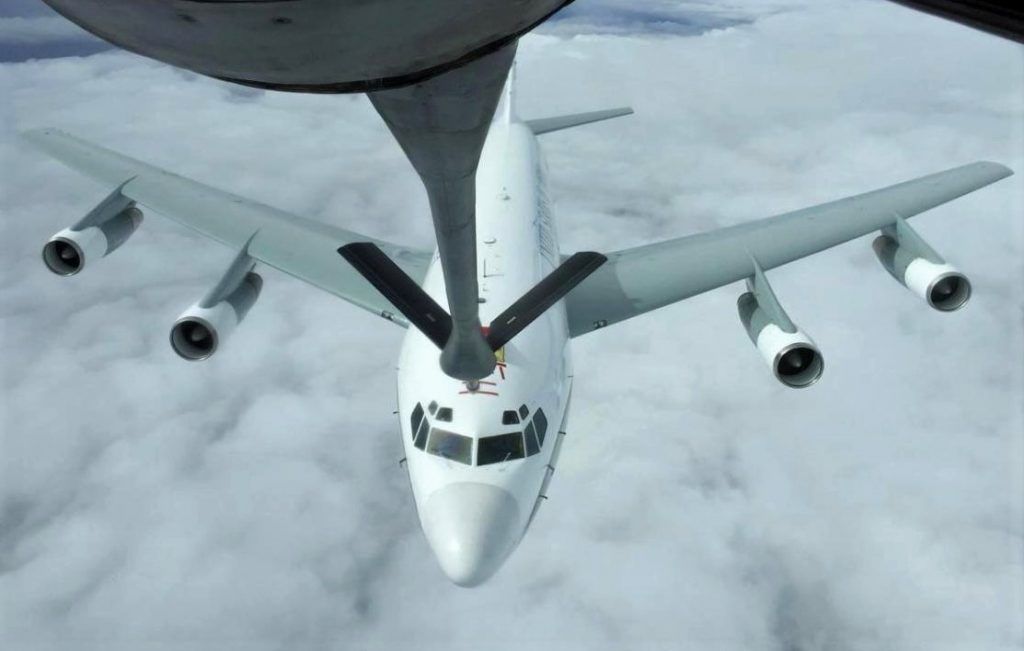The Open Skies Treaty may be the next victim in a spiraling arms control extinction
By Lawrence J. Korb | October 10, 2019
 A US Open Skies aircraft approaches a refueling aircraft, September 2014. Photo credit US Air Force.
A US Open Skies aircraft approaches a refueling aircraft, September 2014. Photo credit US Air Force.
If President Trump follows through on his threat to withdraw from the Open Skies Treaty, it will undermine US and global security.
The treaty, which was signed in 1992 and went into effect in 2002, has 34 state parties. 32 of these member states are in Europe and include Russia. The only two non-European states are the United States and Canada.
The treaty allows each of the member states to conduct unarmed surveillance flights over each other’s territories to verify arms control agreements and to share the information with the other members. Since the treaty came into force, state parties have flown more than 1,400 flights over each other’s territory.
It grew out of a 1955 proposal by President Eisenhower to allow nations to conduct mutual surveillance flights to calm fears about potential sneak attacks.
Like any treaty, Open Skies has not worked perfectly. Officials in the United States have alleged that Russia has violated it. For example, Moscow has limited the distance of some flights over the Russian enclave of Kaliningrad to a maximum of 500 kilometers since 2014 and blocked all flyovers near the border between Russia and Georgia since 2010. However, while it is true that these restrictions are violations of the treaty, they have had little real effect on our monitoring ability. Further, the United States has responded by blocking proposed Russian flights over the Pacific fleet in Hawaii and missile defense interceptor sites in Alaska. Still, working to identify and resolve violations is part of enforcing any treaty, and in the past the United States and Russia were able to resolve issues that came up.
But overall, the treaty has benefited the United States, which is a much more open society than many of the other signatories, especially Russia. For example, as four Democratic members of the US Congress noted in a letter to the Trump administration, under the treaty, the United States was able to conduct flights in 2014 after Russia annexed Ukraine and in 2018 when the Russians seized three Ukrainian ships and their crews in the Black Sea. Ironically, the United States has overflown Russia three times more often than Russia has overflown the United States.
Most important, however, withdrawing from the Open Skies Treaty will continue the process of undermining the arms control regime between the United States and Soviet Russia that has been built up over decades, starting in 1972 under President Richard Nixon. President George W. Bush began the process of undercutting this arms control regime in 2002 when he unilaterally withdrew from the Anti-Ballistic Missile Treaty. Trump accelerated the decline by unilaterally withdrawing from the Intermediate-range Nuclear Forces (INF) Treaty and refusing to take Russian President Vladimir Putin up on his offer to extend New START, which expires in February 2021.
In short, there is no sound basis for pulling out of the Open Skies Treaty. Rather than withdrawing, the United States should be upgrading its own aging observation planes to match Russia’s more advanced aircraft and discussing ways to modify and revive the now-defunct INF Treaty and extend New START.
Together, we make the world safer.
The Bulletin elevates expert voices above the noise. But as an independent nonprofit organization, our operations depend on the support of readers like you. Help us continue to deliver quality journalism that holds leaders accountable. Your support of our work at any level is important. In return, we promise our coverage will be understandable, influential, vigilant, solution-oriented, and fair-minded. Together we can make a difference.
Keywords: Open skies treaty, Russia, Ukraine, arms control
Topics: Nuclear Risk, Opinion















